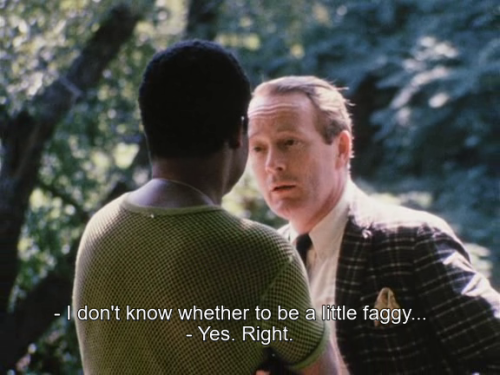While the cast is purposely interchangeable throughout the film, making Alice and Freddie seem more
While the cast is purposely interchangeable throughout the film, making Alice and Freddie seem more like parts than people, we mostly are cursed to be in the company of main actors Patricia Ree Gilbert and Don Fellows (who looks like a cheapjack Bob Newhart). Gilbert and Fellows somehow make their characters even more objectionable than one could imagine on the page, tapping into subsumed rages that feel as though they’re targeting Greaves as much as each other. But it’s off-camera (which, in this film, is always on camera) that they come across as most haplessly neurotic—and, in Fellows’s case, cluelessly offensive, even considering the parlance of the times. Fellows at one point pulls Greaves aside on one of Central Park’s footbridges to talk about his approach to the character: “I don’t know whether to play a bisexual … I don’t know whether this is a faggy fag or a butch fag.” After an amusing, brief, and seemingly unmotivated camera pan over to a shirtless stud passing under the bridge in a rowboat, he concludes, “I’d like to play him as a closet fag … So I’ll just go ahead and play it straight.” In other words, play it safe. Greaves laughs—presumably at the actor’s desperate contortions to come out on top, brave yet masculine—and walks away, shaking his head and muttering, “It’s too much.” (…) Greaves was not just cognizant of the social/political/racial/sexual limitations of Method acting in general, he was spotlighting them and pushing them to their breaking point. Writes Shonni Enelow in her description of the film in her book Method Acting and Its Discontents: “Method acting acknowledges the crisis of scriptedness: the crisis of the script’s suddenly apparent, apparently incontrovertible, inadequacy.” Greaves’s putting his actors through these agonizing motions—and agonizing, heterosexual panic—was not just game-playing for its own sake. Such acting exercises expose Alice and Bill as social constructs. As a result, their witless, homophobic dialogue comes across as nothing less than the last gasps of a whiny, feckless bourgeoisie.Queer & Now & Then: 1971 -- source link
Tumblr Blog : folms.tumblr.com
#william greaves



